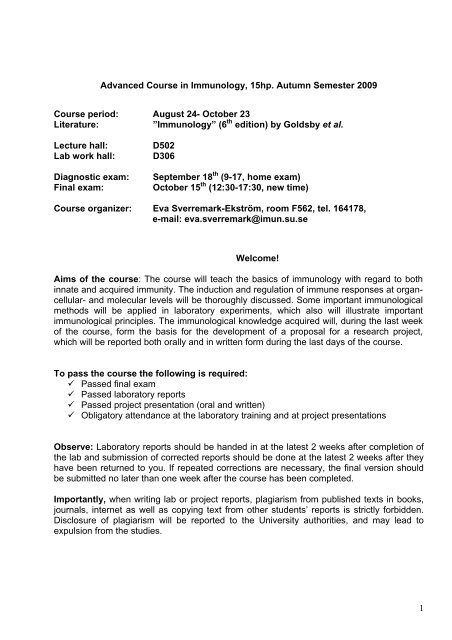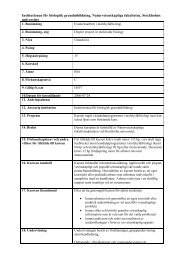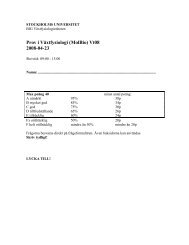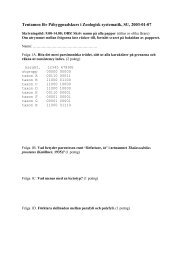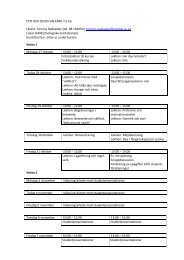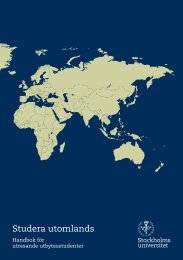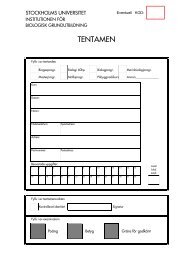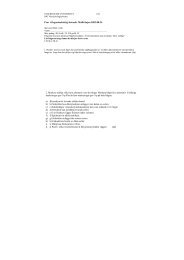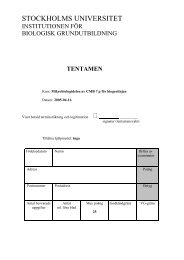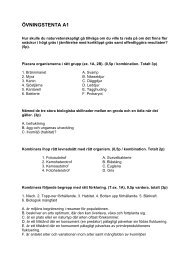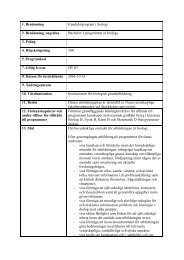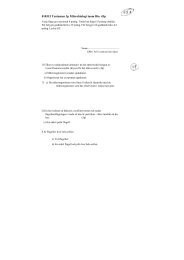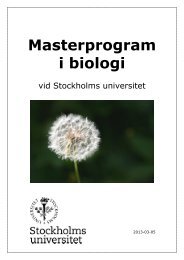1 Advanced Course in Immunology, 15hp. Autumn Semester ... - BIG
1 Advanced Course in Immunology, 15hp. Autumn Semester ... - BIG
1 Advanced Course in Immunology, 15hp. Autumn Semester ... - BIG
- No tags were found...
You also want an ePaper? Increase the reach of your titles
YUMPU automatically turns print PDFs into web optimized ePapers that Google loves.
<strong>Advanced</strong> <strong>Course</strong> <strong>in</strong> <strong>Immunology</strong>, <strong>15hp</strong>. <strong>Autumn</strong> <strong>Semester</strong> 2009<strong>Course</strong> period: August 24- October 23Literature:”<strong>Immunology</strong>” (6 th edition) by Goldsby et al.Lecture hall:Lab work hall:Diagnostic exam:F<strong>in</strong>al exam:D502D306September 18 th (9-17, home exam)October 15 th (12:30-17:30, new time)<strong>Course</strong> organizer: Eva Sverremark-Ekström, room F562, tel. 164178,e-mail: eva.sverremark@imun.su.seWelcome!Aims of the course: The course will teach the basics of immunology with regard to both<strong>in</strong>nate and acquired immunity. The <strong>in</strong>duction and regulation of immune responses at organcellular-and molecular levels will be thoroughly discussed. Some important immunologicalmethods will be applied <strong>in</strong> laboratory experiments, which also will illustrate importantimmunological pr<strong>in</strong>ciples. The immunological knowledge acquired will, dur<strong>in</strong>g the last weekof the course, form the basis for the development of a proposal for a research project,which will be reported both orally and <strong>in</strong> written form dur<strong>in</strong>g the last days of the course.To pass the course the follow<strong>in</strong>g is required: Passed f<strong>in</strong>al exam Passed laboratory reports Passed project presentation (oral and written) Obligatory attendance at the laboratory tra<strong>in</strong><strong>in</strong>g and at project presentationsObserve: Laboratory reports should be handed <strong>in</strong> at the latest 2 weeks after completion ofthe lab and submission of corrected reports should be done at the latest 2 weeks after theyhave been returned to you. If repeated corrections are necessary, the f<strong>in</strong>al version shouldbe submitted no later than one week after the course has been completed.Importantly, when writ<strong>in</strong>g lab or project reports, plagiarism from published texts <strong>in</strong> books,journals, <strong>in</strong>ternet as well as copy<strong>in</strong>g text from other students’ reports is strictly forbidden.Disclosure of plagiarism will be reported to the University authorities, and may lead toexpulsion from the studies.1
LecturersCarmen Fernandez Professor Stockholm University(carmen.fernandez@imun.su.se)Ulrika Holmlund Ph.D. Stockholm University(ulrika@imun.su.se)Eva Sever<strong>in</strong>son Professor Stockholm University(evasev@wgi.su.se)Eva Sverremark-Ekström Associate Professor Stockholm University(eva.sverremark@imun.su.se)Marita Troye-Blomberg Professor Stockholm University(marita@imun.su.se)Mehmet Uzunel Ph. D. Karol<strong>in</strong>ska Institutet(Mehmet.Uzunel@ki.se)Assistants:Pablo GiustiMaria JohanssonEbba Sohlbergpablo@imun.su.semaria.johansson@imun.su.seebba.sohlberg@imun.su.se2
<strong>Advanced</strong> immunology, <strong>15hp</strong>, AS-2009Date Morn<strong>in</strong>g session 9.15-12 Afternoon session 13-16MonRoll call D502 Intr. to immunology24/8 (Ch1 )(Eva Sverremark-Ekström, ESE)Tue Cells and organs of the immune system Innate aspects of the immune25/8 (Ch 2) (Eva Sever<strong>in</strong>son, ES) system (Ch 3)(Carmen Fernandez, CF)Wed Home study Home study26/8Thu Antigens & immunogenicity Immunological methods27/8 (Ch 4) (CF) (Ch 6, 22) (ES)Fri Home study 14-16: Immunoglobul<strong>in</strong>s (Ig), T-cell28/8 receptors, Ig-superfamily(Ch 4, 5 9) (CF)________________________________________________________________________Mon Ig genes, early B cell development B cell generation,31/8 generation of diversity activation and differentiation(Ch 5, 11) (CF)(Ch 5, 11) (ES)Tue Transplantation antigens Antigen process<strong>in</strong>g & presentation1/9 (Ch 8) (ESE) T-cell activation (Ch 8, 10)(Marita Troye-Blomberg, MTB)Wed Home study Home study2/9Thu3/9Lab exercise: Lymphoid organs <strong>in</strong> the mouse, FACS analysis (all day)Fri T-cell receptors & T-cell differentiation Theoretical lab exercise:4/9 (Ch 9, 10) (MTB) PcR analysis of generearrangement____________________________________________________________________Mon Cytok<strong>in</strong>es: structure, function & 13-14: Monoclonal antibodies7/9 signal transduction (Ch 12) (ES) (Ch 4) (CF)Tue Cytotoxic T cells and Natural Killer cells Home study8/9 (Ch14) (ESE)Wed Home study Home study9/9Thu10/9Fri11/9Lab excercise: isolation of specific antibodies (whole day)Lab excercise: isolation of specific antibodies (whole day)3
Date Morn<strong>in</strong>g session 9.15-12 Afternoon session 13- 16Mon Leukocyte activation & migration; <strong>in</strong>flammation Home study14/9 (Ch 13) (ES)Tue Home study Home study15/9Wed Home study Home study16/9Thu 10-12 Tutorial session Home Study17/9Fri Diagnostic exam (home exam)18/9 Available 9-17Mon Transplantation immunology Lab exercise: mitogen activation21/9 (Ch 17) (Mehmet Uzunel) of lymphocytesTue Immunity to <strong>in</strong>fections Parasite immunology22/9 (Ch 18) (MTB) (Ch 18) (MTB)Wed23/9Thu24/9Lab exercise: mitogen activation of lymphocytes (all day)Lab exercise: mitogen activation of lymphocytes (all day)Fri Lab exercise: mitogen activation of lymphocytes (all day)25/9________________________________________________________________________Mon Immunological tolerance, regulation of the Home study28/9 immune response (Ch 10, 16) (MTB)Tue Hypersensitivity reactions, allergy Home study29/9 (Ch 15) (Ulrika Holmlund, UH)Wed Home study Home study30/9Thu Vacc<strong>in</strong>es Home study1/10 (Ch 19) (CF)Fri Autoimmunity Home study2/10 (Ch 16) (UH)________________________________________________________________________4
Date Morn<strong>in</strong>g session 9.15-12 Afternoon session 13- 16Mon Home study Home study5/10Tue Cancer and the immune system 13-15 Return of diagnostic6/10 (Ch 21) (ESE) exam, <strong>in</strong>structions for projectsResearch presentationsWed Immunodeficencies BÄR, <strong>in</strong>fo on courses and7/10 (Ch 20) (ESE) degree projectsThu Home study Home study8/10Fri Home study Home Study9/10________________________________________________________________________Mon 10-12 Tutorial session Home study12/10Tue Home study Home study13/10Wed Home study Home study14/10Thu15/10Fri16/1012:30 - 17:30 Frescati Backe 107 F<strong>in</strong>al examProject work (all day)________________________________________________________________________Mon19/10Tue20/10Wed21/10Thu22/10Project work (all day)Project work (all day)Project work (all day)Project work (all day)Fri Project presentations (all day)23/10 <strong>Course</strong> evaluationExam returned______________________________________________________________End of course5
Grad<strong>in</strong>g criteria for the candidate course <strong>in</strong> <strong>Immunology</strong> 15 creditsThe grad<strong>in</strong>g levels are as follows:A = excellent E = sufficientB = very goodFx = failC = goodF = failD = satisfactoryPart 1 theoretical 7,5 creditsThe grade A is awarded if the student has achieved at least 95% of the maximum po<strong>in</strong>ts available <strong>in</strong> thewritten exam<strong>in</strong>ation and been actively participat<strong>in</strong>g <strong>in</strong> lectures.The grade B is awarded if the student has achieved at least 85% of the maximum po<strong>in</strong>ts available <strong>in</strong> thewritten exam<strong>in</strong>ation.The grade C is awarded if the student has achieved at least 75% of the maximum po<strong>in</strong>ts available <strong>in</strong> thewritten exam<strong>in</strong>ation.The grade D is awarded if the student has achieved at least 65% of the maximum po<strong>in</strong>ts available <strong>in</strong> thewritten exam<strong>in</strong>ation.The grade E is awarded if the student has achieved at least 60% of the maximum po<strong>in</strong>ts available <strong>in</strong> thewritten exam<strong>in</strong>ation.The grade Fx is awarded if the student has achieved at least 50% of the maximum po<strong>in</strong>ts available <strong>in</strong> thewritten exam<strong>in</strong>ation.The grade F is awarded if the student has achieved less than 50% of the maximum po<strong>in</strong>ts available <strong>in</strong> thewritten exam<strong>in</strong>ation.Part II lab exercise 6 creditsGrade CriteraAExcellent lab performance, excellent lab reportBVery good lab performance, very good lab reportCGood lab performance, good lab reportDSatisfactory lab performance, satisfactory lab reportESufficient lab performance, sufficient lab reportFx Insufficient lab performance, <strong>in</strong>sufficient lab reportFDismally <strong>in</strong>sufficient lab performance, dismally <strong>in</strong>sufficient lab reportThe lab performance and the lab report have equal weightsPart III project 1,5 creditsA: Excellent <strong>in</strong>sight <strong>in</strong>to the project area, excellent essay, excellent conduct of sem<strong>in</strong>arB: Very good <strong>in</strong>sight <strong>in</strong>to the project area, very good essay, very good conduct of sem<strong>in</strong>arC: Good <strong>in</strong>sight <strong>in</strong>to the project area, good essay, good conduct of sem<strong>in</strong>arD: Satisfactory <strong>in</strong>sight <strong>in</strong>to the project area, satisfactory essay, satisfactory conduct of sem<strong>in</strong>arE: Sufficient <strong>in</strong>sight <strong>in</strong>to the project area, sufficient essay, sufficient conduct of sem<strong>in</strong>arFx: Insufficient <strong>in</strong>sight <strong>in</strong>to the project area, <strong>in</strong>sufficient essay, <strong>in</strong>sufficient conduct of sem<strong>in</strong>arF: Dismally <strong>in</strong>sufficient <strong>in</strong>sight <strong>in</strong>to the project area, dismally <strong>in</strong>sufficient essay, dismally <strong>in</strong>sufficient conductof sem<strong>in</strong>arThe f<strong>in</strong>al grade of the entire course will be determ<strong>in</strong>ed by tak<strong>in</strong>g <strong>in</strong>to account the grade for the different parts<strong>in</strong> proportion to their weight <strong>in</strong> credits.6


